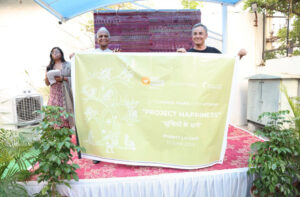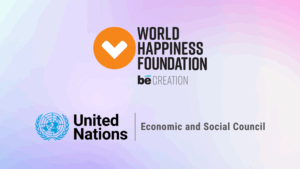
A Dream Come True: My Journey with NKC and the Team at Jaipur Rugs
As I reflect on the incredible journey I’ve had the

Whether you are a marketing manager or a gardener, or any other title with which you define yourself, time passes the same way for everyone, acting as an equalizer. And if Mihaly Csikszentmihalyi was right, if we truly want to be happy, we should focus on how we spend our time rather than on the titles and things we accumulate. As he would argue, it is not the activity we choose to do that is crucial to our happiness, in fact, this often has little to no effect on our state of mind.
Instead, it has everything to do with the quality of our mental focus at the moment, and I would add, with the purpose for doing the activity, which is for me – making other people happy and prosperous. As Csikszentmihalyi would further explain, people are at their happiest and most productive state when they are able to enter the state of flow, a blissful experience of total concentration that requires your full attention. This mostly happens when we are at work because we are at our most skillful and challenged state when working, and therefore we feel more happy, creative, and satisfied.
So, if we want to be happy and if we can achieve happiness with our skills and devotion, can we then combine these two aspects to spread joy to others? Yes, most certainly so. How? With time banking.
Before I delve deeper into explaining what time banking is and the importance it can have on people, communities, and society in general; I would like to ask you how many times you thought to yourself: “If only I had enough time to do this or that..I would be so happy,” or “I wish I knew how to do this, it would make my life so much easier.” At least a dozen times, right? Time banking is a solution for this type of problem. Now, let me explain how:
Time banking is a means of exchange used to organize people around a purpose, where time is the main currency. For every hour participants deposit in a time bank, for instance, by giving practical lessons on a specific subject or helping someone move, they are able to ‘withdraw’ equivalent help in time when they are in need. In each case, a person decides what they can offer to others. Since everyone’s time is equal, one hour of your time is equivalent to one hour of my time, irrespective of whatever service we choose to exchange.
Time banking can also be defined as a system of bartering, but instead of money, units of labor-time are used to exchange services. It is an intermediate system between a system of indirect monetary exchange and a gift economy. Theoretically, any type of service can be exchanged for another. However, services traded are often simple, low market-value tasks, such as care for the elderly, social work, or home repair.
Various socialist thinkers developed this system based on the famous labor theory of value. The term’ time banking’ was coined and trademarked in the 1980s by American social justice advocate and professor of law Edgar S. Cahn, who advocated its use to supplement government social services. He promoted the concept of time banking as a means for community self-help and to fill the gap in public social services in times when the Reagan administration was pushing cuts to spend on social programs.
Edgar Cahn outlined five main time banking principles in his book No More Throw-Away People, They are:
Time banking can be considered (and is mostly used as) a form of community non-monetary currency. However, because the time units of account are not usually accepted outside the membership of the time bank, nor for general products traded in the market other than specific labor services, it doesn’t constitute a form of money in an economic sense outside the inherently limited context of the time bank itself.
‘No society has the money to buy, at market prices, what it takes to raise children, make a neighborhood safe, care for the elderly, make democracy work or address systemic injustices… the only way the world is going to address the social problems that are dumped on it is by enlisting the very people who are now classified as’ clients’ and ‘consumers’ and converting them into co-workers, partners and rebuilders of the core economy.’ – Edgar Cahn.
Even before the global pandemic, life has substantially changed for the modern man. We work too much and have too little time for ourselves, and our friends and family often live far from us. It is not always so easy to ask someone for help, especially if asking them brings up the feeling that we can never actually pay them back. This is an even bigger problem for older people. Time banking is a fun, informal, and unpressurized way for people to get what they need and to bring the best in everyone.
According to the research done by Timebanking UK, joining a time bank system can change people’s lives. After taking part in exchanges, timebank participants have reported that they’ve managed to learn new skills, met lots of new people, enjoyed greater self-esteem and self-confidence, and felt much healthier. They have enjoyed sharing their passions and felt more involved in their communities, as well.
Timebanking UK’s case studies further show the following statistics for people who had been participants in this unique system for half a year:
This tells us that time banking enables people to realize they are useful and appreciated as valued members of their communities and society in general. By participating in this movement, people feel better, more connected, and most importantly – Happier!
Unlike the (global) market, time banking values equally all hours of work: one hour of your time is one labor-time credit (or ‘time dollar’ as some US time banks like to call it).Therefore, it could be argued that the time banking system favors those people with more time, which creates non-market wealth. But, as Edgar Cahn explains it, time banks help create a greater balance of power between those with larger ‘wealth in time’ and those with bigger ‘monetary wealth.’ The time banking system elevates the non-market economy as a necessary source of vitality, energy, insight, knowledge, and essential labor.
‘Labor-time credits link people in a social network; each act of caring triggers a reciprocal act so that every transaction has social capital built in.’ – Edgar Cahn.
The beauty of time banking is recognizing that everyone, even those described as vulnerable or disadvantaged, has something worth contributing. All-time is cherished equally in time banking. This is the opposite of the typical market approach, where one person’s time in service can be valued higher than another’s. Even in such situations as traditional volunteering, there is a one-way transaction happening, which can enhance social hierarchies. On the other hand, time banking is a two-way type of transaction, a reciprocal arrangement where power differences between people are substantially minimized.
In the time banking system, giving and receiving is a straightforward and fundamental way of creating trust between people. This is especially important for marginalized people and communities, whose capacities have been overshadowed by their problems and needs—through time banking, the socially excluded become providers of valuable and useful services. In fact, they are all providers AND users of services, through which they are building mutual trust within their communities.
There are three reasons for the rapid growth of time banking:
Cahn says: ‘Paper money leaves no trail; people come and go as strangers. On the other hand, trust requires memory. When money replaces trust, trust disappears.‘ I couldn’t agree more.
At the heart of time banking is the opportunity for people to gain self-esteem and self-confidence when others believe they have something useful to offer. Time banking is based on trust and hope for the future. People gain joy and strength from being able to help others, and by doing so, they increase their confidence and self-respect. Those who deal with high levels of anxiety, depression, and loneliness experience a positive impact on their mental and physical health by participating in time banking. However, time banking is not limited solely to younger people since this system also offers a sense of structure, purpose, and fulfillment to retired people and those out of work.
This brings me to the beginning of this blog and Mihaly Csikszentmihalyi’s theory of happiness through the state of flow. We are often confused about what genuine happiness is and what it looks like from one moment to the next. We tell ourselves that we will be happy if we get enough money, not understanding that even after the money is in the bank, we will be just as unhappy as before if we live a life without connection and purpose.
Instead, what we should do is be careful about how we utilize our time. It is always a good idea to set up our days, whether at work or on holiday, to move from one purposeful moment to another. Or, in other words, we should use our time to do things that will help others and simultaneously make us happy.
The challenges our society and public services face are there for everyone to see: rates of chronic disease and mental health issues are rapidly rising, the population is aging, the gap widens between rich and poor, and public finances are increasingly unstable. How can we approach these challenges? We can do it in three ways:
My goal is to start a time banking movement and invite people to participate and help others learn or do something important for themselves, and in doing so, help everyone else feel happier and fulfilled. Invest your most precious commodity – time, in time banking and see how it pays in happiness dividends.
Join the World Happiness Fest TimeBank here.


As I reflect on the incredible journey I’ve had the

By Luis Miguel Gallardo, President of the World Happiness Foundation

As I sit on the banks of the Ganga in
